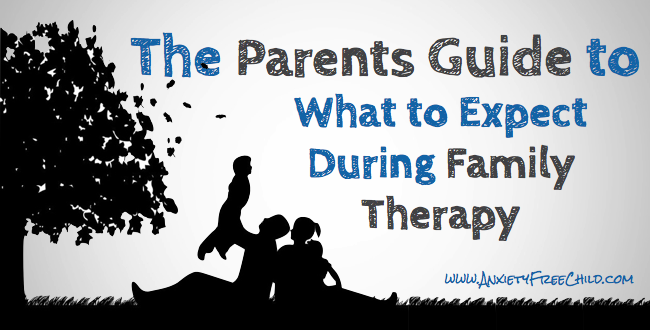 Family therapy may not be as thrilling as, say, a trip to Disneyland, but it can provide long-term positive effects that outlast any memory of Mickey Mouse. Better yet, it may be an effective supplement to the overall treatment of your anxious child.
Family therapy may not be as thrilling as, say, a trip to Disneyland, but it can provide long-term positive effects that outlast any memory of Mickey Mouse. Better yet, it may be an effective supplement to the overall treatment of your anxious child.
Contrary to some old-school beliefs, family therapy is not a place where family members sit around and yell at each other. It is not meant to point fingers, throw blame at the parents for their child’s anxiety or hurl accusations at anyone. Family therapy is instead a method of psychotherapy that involves your anxious child and other family members.
Mayo Clinic notes the overall goal is to help family members learn to better understand one another, enhance family communication and get through conflicts or challenging situations.
Sessions usually last around 50 minutes. They can be headed by a psychological, social worker or licensed therapist, all of whom have graduate or postgraduate degrees. Your therapist may additionally hold credentials from the American Association for Marriage and Family Therapy, or AAMFT. Our Parents Guide on Picking a Therapist for Your Anxious Child offers in-depth details on how to find a therapist that can work for your child and your family.
How It Works
 The methods used in family therapy can vary greatly, and every member of the family may not necessarily have to attend every single session. The first session gives your therapist a chance to learn more about your family and what’s going on while subsequent session can focus on the family dynamic and pertinent issues. Treatment may be short-term, lasting around six months, if you are focusing on specific issues that end up resolved. Longer-term treatment can also be an option.
The methods used in family therapy can vary greatly, and every member of the family may not necessarily have to attend every single session. The first session gives your therapist a chance to learn more about your family and what’s going on while subsequent session can focus on the family dynamic and pertinent issues. Treatment may be short-term, lasting around six months, if you are focusing on specific issues that end up resolved. Longer-term treatment can also be an option.
Mayo Clinic says family therapy sessions can:
- Review your family’s current communication abilities, such as how you express emotions and thoughts
- Explore how you normally resolve conflicts
- Examine the family rules, roles and behaviors to discern those that may be detrimental or contribute to conflict
- Offer productive ways to work through conflicts and issues
- Point out a family’s strengths and weakness and offer tips on improving both
So How Does This Help Your Anxious Child?
Let’s say your child has long suffered from anxiety, but your family doesn’t really get how to deal with it. You fret about your child’s state of mind, which increases your stress levels and takes attention away from the rest of your family.
Let’s say you also try to “fix” your anxious child’s anxiety by giving him whatever he wants, whenever he wants it. Your other family members become annoyed and arguments erupt. Your anxious child, in the meantime, has discovered that a new toy can be had if he throws anxiety-fueled tantrums or stays awake all night screaming about how he’s scared.
The end result of this example is a family that is pretty much shredded. Your anxious child is screaming, your other family members are resentful and you are a stressed-out mess. No one communicates beyond the sound of a slamming door and you’re going broke buying your anxious child toys so he stops screaming.
Family therapy can help you pinpoint the actions that contributed to the family breakdown and offer ways to correct those actions. Your therapist can help you see where you’re at, explore where you want to be and collaborate on ways your family can get there.
You, your anxious child and other family members can also gain a better understanding of your child’s anxiety. Everyone may leave with not only an improved understanding of a variety of family issues, but you can also go home with a pocket full of solutions to help address them. And you don’t even need another trip to Disneyland to do it.
“Family therapy sessions can teach you skills to deepen family connections and get through stressful times,” Mayo Clinic says, “even after you’re done going to therapy sessions.”
Does It Work?
 Well, yes, it certainly can. Family therapy can be highly effective, provided participants are honest, open and willing. A therapist would have a tough time helping anyone if the person hides the truth or sits there, closed down, with his or her arms crossed firm across the chest.
Well, yes, it certainly can. Family therapy can be highly effective, provided participants are honest, open and willing. A therapist would have a tough time helping anyone if the person hides the truth or sits there, closed down, with his or her arms crossed firm across the chest.
While family therapy is not a magical cure, a research review published in Journal of the American Academy of Child and Adolescent Psychiatry backs it as an effective treatment for a number of childhood issues. The review suggests supplementing treatment plans with family therapy can help children with:
- Anxiety
- Depression
- Substance abuse
- Behavioral problems
- Academic woes
- ADHD
- Various mental health disorders
The research article found that involving parents in therapy sessions for treating children with schizophrenia cuts the risk of the child’s schizophrenic relapse by a full 50 percent. Not bad at all.
Tips to Help Your Anxious Child Prepare for Therapy
Those aforementioned traits of honesty and openness can go a long way toward helping your child prepare for your first visit. Tips from KidsHealth.org can help prepare for the first visit and beyond:
Explain to your child why your family is going to try therapy. Bringing up concrete examples of situations that were particularly challenging for the family can help, as can noting the difficult emotions and behaviors that family members experience. You can say something like: “Wouldn’t it be nice if we could all make that situation better with some help?”
Discuss what a therapist is and does. KidsHealth suggests using the analogy of a medical doc for younger children. You can point out a therapist is similar to a doctor but without the physical exam (or shots!). Give your child a brief overview of what to expect. Explain how therapists talk to family members to find out how they can help make the family get along better.
Stress how the entire family could do well with such help, not just your anxious child. You can also point out that anything your child says to the therapist is confidential information that no one else know. The only exception is if patients are perceived as likely to do something that harms themselves or others.
Offer support. Therapy sessions can leave family member drained or even temporarily increase your child’s anxiety by bringing up difficult issues and emotions. Be there for them. Let your child and other family members that you are available to listen to their concerns. Set special time aside where you can have meaningful discussions and show you care.
Practice what you’ve learned. Try to implement the tools you learned in therapy in your home, and point out when you, your anxious child and other family members can do so. You can also set up family meetings to further enhance communication and discuss anything that comes up between therapy sessions. Top it off with a fun activity, like a jaunt to the park or engaging in a favorite family activity.
Bringing the lessons home and incorporating them into your own lives is where the long-term healing and harmony can begin.
SOURCES:





